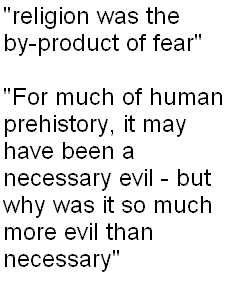"3001 The Final Odyssey" (novel): Somewhat anticlimactic

Also, this book liberally copies whole passages from previous books in the series.
Story summary (spoiler).
First one third of the book is a kind of time warp: imagine you moved 1000 years ahead in time; how would you react to human society of this future. There have been perhaps a half dozen movies on the subject - both in Bombay, & in Hollywood. But Clarke is creative. Cannot fault him for borrowing from these movies.
Among the many devices described here, you find a mention of space ships that use "anti-gravity", a technology that first appears in "Rescue Party" - the mother of all Clarke stories.
Middle one third is generally slow paced: a voyage from earth to Ganymede, & a little excursion from Ganymede to Europa. Sole interesting part of the book is in the middle of this section - a short philosophical discourse on human nature; I copy some quotes below.
Note that a similar voyage to Ganymede, & then to another moon in Jupiter system, also happens in "Jupiter Five" - the story that will ultimately become "The Songs of Distant Earth".
Last third is about as fantastic as the last story in 2001. Unimaginably powerful gods are humbled by humans!
Last third also partially explains the discrepancy in the series so far: around 22,000 AD, Europans are at about the level of stone age humans in development, & Lucifer is shining. But in 3000 AD, Lucifer has stopped shining! We are now told this "stopped shining" was a temporary phenomenon that lasted only a few hours - as humans outwitted gods.
There is still a discrepancy remaining in the series. If humans outwitted gods in 3000 AD, how come Europans are still happy & safe from humans on Europa in 20,000 AD; and still protected by TMA in Europa that vanished when humans attacked gods in 3000 AD! But as Clarke explains towards the end of this book - it is fiction written over three decades. Don't bother with discrepancies. Enjoy the stories, instead of doing nit picking.
Quotations.
Quotes below are all taken from a little philosophical discussion near the middle of this book.
- "religion was the by-product of fear - a reaction to a mysterious and often hostile universe. For much of human prehistory, it may have been a necessary evil - but why was it so much more evil than necessary". "I said evil - and I mean it, because fear leads to cruelty".
- "obvious madmen, century after century, will proclaim that they - and they alone! - had received messages from God. If all the messages had agreed, they would have settled the matter. But of course they were wildly discordant - which never prevented self-styled messiahs from gathering hundreds - sometimes millions - of adherents".
- "most of the humanity has always been insane, at least some of the time".
- "There's never been anything, however absurd, that countless people weren't prepared to believe, often so passionately that they'd fight to the death rather than abandon their illusions. To me, that's a good operational definition of insanity."
- "Do you believe in ghosts, Dim?" "Certainly not: but like every sensible man, I'm afraid of them."
3001 The Final Odyssey, novel, review
Author: Arthur C Clarke
Genre: Fantasy
First published: 1997
Rating: B
See also:
- "Space Odyssey series summary"
- "Influences" section of "Rescue Party"
- The ring habitat connected to earth with many spokes around equator that are space elevators that we see in first one third of this story also appears at the end of "The Fountains of Paradise". But there, we see it in about 4000 AD, & without details of its interior.
- "The City & the Stars", a much earlier novel, has a religious discourse about its middle that is essentially the same as that in the middle of this book.
- "Imperial Earth" is another Clarkian story that describes human life about the year 3000 AD. I personally find Imperial Earth's descriptions far more realistic.


2 comments:
A feature of this novel that always struck me is that Clarke shows that personal privacy is not nearly as important as the press and many people now claim. In fact, most people really are not interested in your little "personal secrets" [you flunked 10th grade chemistry, you have 3 unpaid speeding tickets, you made $129,000 in 2004, you underpaid your 2001 taxes by $2,100, your brother is an alcoholic, etc.]
Some years back, in a Mumbai suburb in India, there were several cases of extortion of independent medical doctors. Extortionists used data from their annual income tax returns - probably obtained via corrupt means. In one case, a doctor was actually killed.
Usually, no harm will come when your personal data leaks. Sometimes, great harm can result. It is best to be paranoid about safety of personal data.
Post a Comment